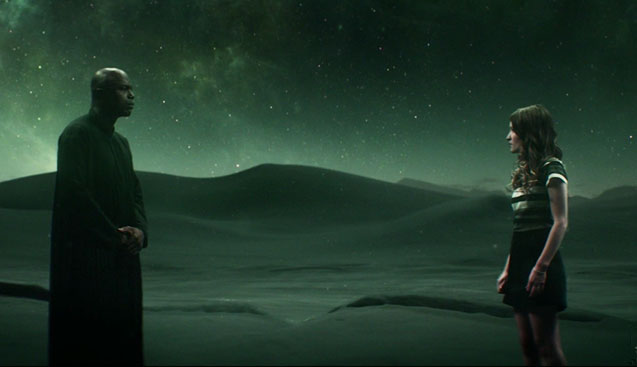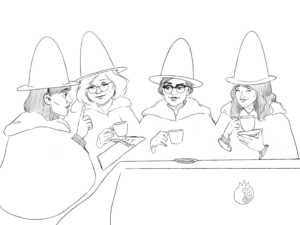You know how in myths and legends, making a wish is a great way to invite punishment from divine presences? I — a person who doesn’t learn anything, apparently — wished that American Gods Episode 4: Git Gone would give us a break from Wednesday and flesh out Laura Moon’s character in ways the original novel never bothered to. Guess who got what she wanted and paid for it through almost an hour of unpleasant television? Yeah — it me.

I never had strong feelings about Laura Moon in the American Gods novel. Her entire personality is communicated to us through Shadow and his love for her. We know that Audrey engineers their first (blind) date, and that the first time Laura kisses Shadow, she tasted like strawberries and he never wanted to kiss anybody else again. We also know that Shadow’s nickname, “Puppy,” sprung from an intimate and sweet moment between the two of them.
Now, Book Laura almost certainly loves Shadow less than he loves her. Book Laura can be unlikeable and even cruel at times. But Book Laura has something Show Laura doesn’t: a connection to something vulnerable and real.
(She also has Weaponized Manic Pixie Dream Girl powers, but that’s a subject for another time).
It’s no secret that audiences are harder on unlikeable female characters than unlikeable male antiheroes. Society doesn’t forgive unruly women, and definitely doesn’t venerate them for their single-mindedness and tenacity. Otherwise, there’d be as many modern-day adaptations of Macbeth as there are of Hamlet, and all of them would feature Lady Macbeth as the story’s protagonist. But alas, that is not the world we live in.
But resonant, memorable antiheroes need more than single-mindedness and tenacity — they need to offer their audience a sliver of vulnerability. For example: in Mad Men, Don Draper is a handsome, successful womanizer — and a pathetic, needy drunk with abandonment issues. At the same time, his ex-wife Betty is cruel to her children, ice cold to everyone else, unflinching in her words, and worships the idea of self-control through personal martyrdom. She was also a young woman who wanted to learn, wanted adventures, struggled for her parents’ affection, and was taught to make herself a decorative object at all times. Both characters strive to exhibit an unaffected persona in order to mask their insecurities and unfulfilled desires. Make no mistake: Don and Betty are both terrible human beings — but at least they feel human because even if we don’t always know what emotions they’re hiding below the surface, we know that there’s more to them than we’ll ever get to see.

We root for these characters, even when we hate them. We want them to figure it out. They’re the friends who keep getting into bad relationships — we make them coffee and hear all the new ways they’re doing the same things to fuck up their lives. But there’s something in there we can’t help but connect with, something that makes it worth it for us to clear all this space for them in our imaginations and our lives.
Laura feels like she should be a similarly complex character. We can infer that she’s suffering from depression, that she’s listless and apathetic — and that she’s desperate to control some aspect of the flow of her life. We watch her make messy, questionable decisions as she grows more and more desperate to gain some degree of agency. But most of these statements are guesses, entirely the product of fan speculation. In a show that pushes to hyper-visualize even the subtlest of themes and metaphors (here’s looking at you, Giant CGI Clock from episode 3), American Gods struggles to give viewers even a peek at who Laura is below her disaffected presentation.

And look — I’m glad that American Gods portrayed Laura’s depression as an emotional void, rather than a cliched sweeping, tearful sorrow. As a society, we seem to be coming around to the idea that depression tends to empty us, rather than filling us to the brim with sadness. I appreciate the realism there. But we aren’t entirely comprised of that emptiness. There’s more to us than what we feel, or don’t feel. There’s something in there that we think. We all think. Even when you want to turn off your brain, you usually can’t. Even when the emptiness feels like it’s going to swallow you whole. You’re still in you.
I want to care about Laura. I want to praise and root for difficult women. At the same time, I’m so weary of the “everyone has to be an insufferable piece of shit at all times” mentality that crowds the casts of many prestige dramas. And I can work with that, if I get more from the character than numbness and apathy. I think anyone can relate to Laura’s depression on some level — to feeling empty, or like you’re stuck in a current and can’t swim back home. But under all of that emptiness, like Audrey, I don’t care what she feels — not at this point. I desperately want to know what she thinks — about anything. I want to share one moment with her where I can even sort of see who she is.
Think about it: Laura Moon is 24 years old when Shadow goes to jail. Who knows how long they were married before that point. She’s been working at the casino for 8 years — for tuition, and then rent. (Can 16 year olds work in casinos?) What does Laura really think about this, other than “robbing this casino will probably solve my ennui?” Who’s really in there?
We spent an entire episode of an eight episode season watching Laura drift aimlessly through her miserable life. But it wasn’t until we see her with Audrey that we get a glimpse of anything compelling enough to make the slog feel worthwhile.

Audrey is a precious treasure; too good for Laura, too good for this show; too good for this sinful earth. Shadow should be so lucky as to get a beej from her on Dane Cook’s grave (tho honestly, not really; thank you for not doing that, Shadow).
I can fully see why someone like Laura would gravitate towards someone like Audrey — Audrey, so self-assured, so full of choices. Audrey knows why she scrapbooks, and doesn’t hesitate to criticize the things she loves. Audrey is reflective and deliberate. I can see Laura envying Audrey’s ability to choose without drifting; to own her mistakes and her flaws. I can see why sleeping with Robbie might have felt like conjuring up a bit of Audrey’s power. Betty Gilpin continues to bring out the best in her scene partners through this role, making her scenes with Emily Browning (Laura) a joy to watch.


Plus, Laura pulls some Wednesday-level on-the-nose expository bullshit (“he’s the light of my life!”) and Audrey laughs out loud at her. I wish that Audrey would hitch a ride with Shadow and Wednesday, because I’d really appreciate it if somebody could laugh out loud in Wednesday’s face.
Audrey is difficult, too — she is barbed and angry and messy as fuck, but she’s there and fuck you and she’s not going to let you forget that you fucked her over, even if she’s watching you void your own rotting bowels.

Look: while a lack of personality defines Shadow in the book, and Laura in the show — to the point that it almost explains what they saw in each other, almost — it doesn’t translate to engrossing television, especially when you have to substitute the book’s internal monologues with blank-faced actors trying to exhibit as little emotion as possible. Plus, it’s harder for a detached, disconnected character to stand out when the rest of the cast also struggle to care about others or feel anything at all.
I don’t need everyone in this show to Emote, and I never needed Laura to be effervescent, bubbly, or kind. But as I’ve been saying nearly the entire time I’ve spent watching this dumb show, I want something to connect with. Gaiman worked hard to infuse meaning into small moments and minor supporting characters throughout the American Gods novel. He loves to luxuriate on Victorian phrases and Beowulf references and allusions to the Velvet Underground, but he can drop concise, meaningful phrases and lend a bit of memorable characterization to every bit-part henchman in his stories. I’ll probably forget the name of the first person I ever kissed before I forget that Shadow never wanted to kiss anybody other than Laura again. Those words took root in my brain when I was 16 years old and have stayed there ever since. So, like I always do in these columns, I’m going to expend a little belief wishing that the American Gods TV series will tease out these elements of Gaiman’s writing as the story continues to unfold.
Here’s hoping that next week, the American Gods can grant my wish without punishing me for it.
A few more observations before we close out for the week:
- I can’t believe Laura “Can I Speak To The Manager”s the god of death in his home.

- Equally unbelievable: that Dane Cook is the less-shitty party in the Robbie/Laura affair.
- Did Laura go to Ancient Egyptian hell because she worked in a pyramid-themed casino???????????
- Every shower in this show is so sad.
- Related: a story in four parts:




- Laura’s Cat is a high contender in the American Gods Character Power Rankings imo.
- If this show veered dramatically off-course and entirely consisted of Audrey and Zombie Laura’s Great American Road Trip, I’d happily retract all my complaints about this show, and all of my complaints, just, like, in general.
- THIS PROMO IMAGE IS IN INCREDIBLY POOR TASTE, STARZ.

Til next week, mortals~~~




